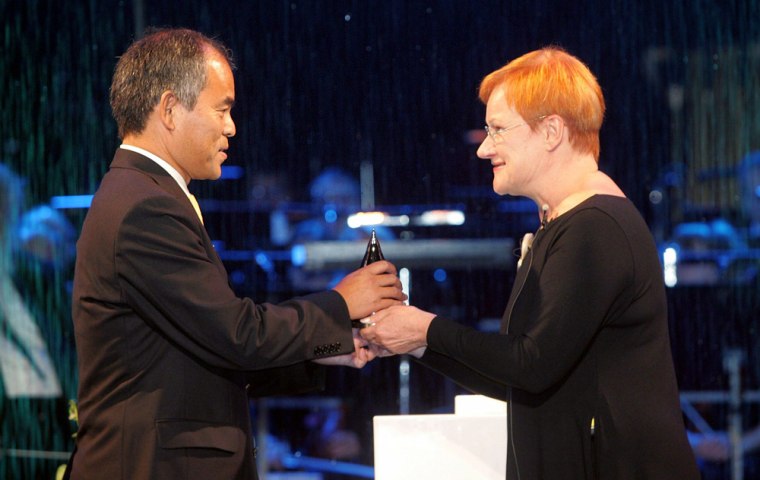The winner of a $1.2 million prize for his inventions in light and laser technology said Friday he will give away some of his money to promote research at universities and organizations that help developing countries.
Shuji Nakamura, now a professor at the University of California, Santa Barbara, received the Millennium Technology Prize on Friday from Finnish President Tarja Halonen on the sidelines of a meeting of European Union finance ministers and central bankers in Helsinki.
The award, announced in June, was for his work in developing the blue light-emitting diode, or LED, widely used in traffic signals, mobile phones and illumination, as well as for packing information onto disks. LED lights have long lives, consume far less energy than normal incandescent lamps, can be used to provide clean drinking water and help cut down on pollution.
Nakamura, 52, whose high-profile patent dispute challenged the Japanese tradition of selfless devotion to employers, said he was "deeply honored" to receive the award. He identified Light Up the World and Engineers Without Borders as among the groups that will share his prize money.
"We have only just begun to realize the great potential of blue LEDs and laser diodes to improve the human quality of life," he told an audience of Finnish and foreign dignitaries.
"I hope this helps us to raise awareness of the potential of (such) lighting to reduce global warming, to provide drinking water and to create inexpensive and unlimited information storage" on discs, such as DVDs, he added.
The biennial prize — "for a technological innovation that significantly improves the quality of human life" — was awarded for the second time since it was established in 2002. Two years ago, its recipient was Tim Berners-Lee, inventor of the World Wide Web.
Nakamura said his original goal was to give engineers and designers a greater palette of LED colors with which to work.
The blue LED's ultraviolet properties give it endless other applications, Nakamura said, including to clean air and water, so it can counter pollution in places like China and India and sanitize refrigerator interiors and other spots where bacteria thrive.
Last year, Nakamura and his former employer, Nichia Corp., reached a $8 million settlement in a high-profile dispute over a lucrative lighting technology patent. The case brought Nakamura fame, symbolizing the struggle of the individual worker against companies over intellectual property in Japan, a nation where selfless corporate devotion has long been the rule.
The Millennium Prize Foundation is an independent fund supported by the Finnish government and several Finnish companies and organizations. The eight-member international selection committee studied 109 nominations from 32 countries for this year's prize.
